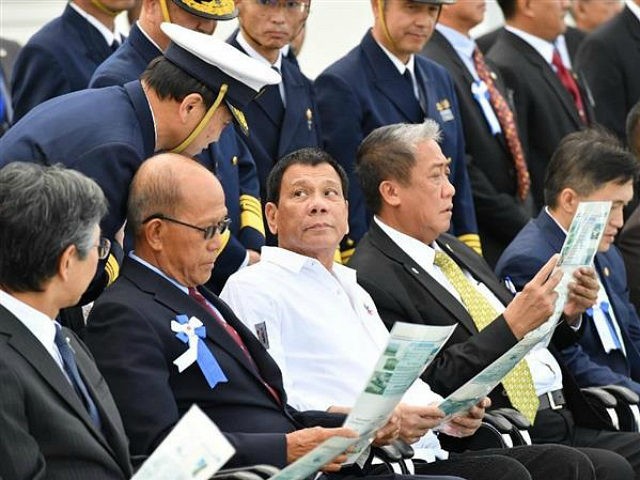In a move that may jeopardize his hard-earned political capital with China, Philippines president Rodrigo Duterte expressed a willingness to engage in joint military exercises with Japan during his trip to Tokyo this week. His remarks follow repeated demands that the U.S. vacate its military posts throughout the Philippines.
“Joint exercise with Japan in general terms is not a problem. Stationing of Japanese troops was not discussed and with the Americans, it’s problematic,” Duterte said on Wednesday, according to Reuters.
“Japan will continue to play an important role in modernizing the capabilities of the Philippines,” he noted at a different event, vowing that “the Philippines will continue to work closely with Japan on issues of common concern in the region … and the peaceful settlements of disputes including the South China Sea.”
The Philippine Star reports that talks between Duterte and high-level Japanese officials in Tokyo, including Prime Minister Shinzo Abe, resulted in “agreements including Japan’s provision of two coast guard boats and T-90 military trainer aircraft as part of its contribution to step up Philippine maritime security capability.”
Duterte attempted to navigate the tensions between Tokyo and Beijing, with whom he promised a new era of cooperation last week. During a speech to businessmen in Tokyo, Duterte reiterated that he wanted “to be friends with China” but focused his remarks more on his antipathy towards the United States than on the antipathy existing between Japan and China.
Of his newfound desire to cooperate more intensely with China, Duterte said in Japan, “I went to China for a visit. And I would like to assure you that all there was, was economics. We did not talk about arms.”
But in China, Duterte told Communist Party officials that he expected to be militarily reliant on China following a diplomatic break with America. “I announce my separation from the United States both in the military … not social, but economics also. America has lost. I have separated from them so I will be dependent on you [China] for a long time, but don’t worry, we will also help,” he said last week.
The Star notes that Abe responded to Duterte’s welcome of Japanese actions in the region in kind, issuing a statement praising Duterte for “visiting China and endeavoring to improve the Philippine-China relations” while also welcoming his call for more military cooperation between Japan and China.
The Chinese Foreign Ministry issued a tepid statement of approval for Duterte’s remarks in Tokyo.
The situation in the South and East China Seas do not appear to allow for such trilateral cooperation, however. China and Japan disagree on the sovereignty of the East China Sea’s Senkaku Islands, which China has claimed as its own and established an Air Defense Identification Zone (ADIZ) over. Japan has ignored the ADIZ since it was announced in 2013, arguing that, if China enforces it and attacks a Japanese aircraft over Japanese territory, the United States is treaty-bound to attack China. China nonetheless has continued to establish itself in the region, most recently flying warcraft over the islands in September.
Japan does not claim any territory in the South China Sea. China has nonetheless accused Japan of meddling in the complex territorial dispute in that region. China claims territory there belonging to the Philippines, Vietnam, Taiwan, Brunei, Malaysia, and Indonesia. The Permanent Court of Arbitration at the Hague found China’s claims to be invalid in July; the Chinese government, through its media outlets, accused Japanese “eunuchs” of influencing the international court.

COMMENTS
Please let us know if you're having issues with commenting.